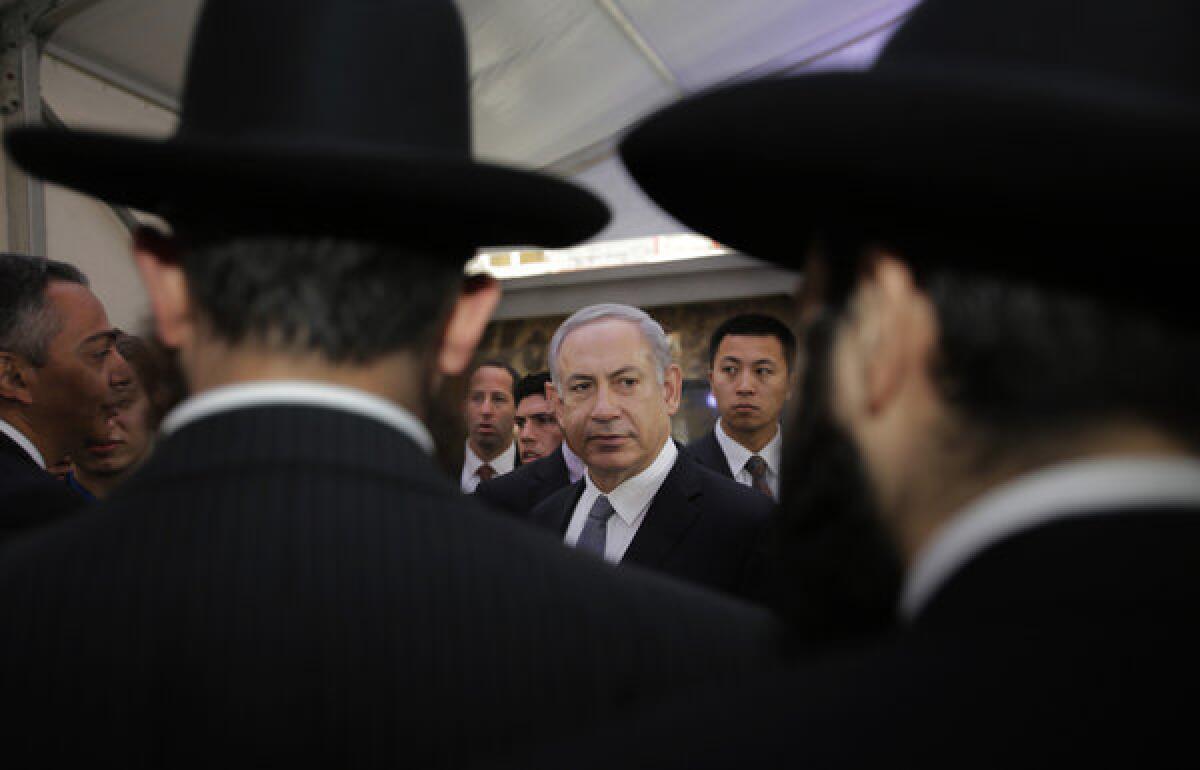Israel’s Netanyahu visits China but avoids Palestinian leader Abbas

BEIJING -- Israeli Prime Minister Benjamin Netanyahu toured Shanghai on Tuesday, paying tribute to the city’s role sheltering Jews during World War II and conveniently avoiding Palestinian Authority President Mahmoud Abbas, who was visiting Beijing.
The concurrent visits to China of the Middle East antagonists created some diplomatic awkwardness. Although the official Chinese Communist Party newspaper Global Times suggested the two might hold an impromptu meeting, Netanyahu’s itinerary apparently was arranged to avoid that possibility.
“Abu Mazen is in Beijing,” said an Israeli official who requested anonymity, using Abbas’ nickname. “They didn’t want to meet on the same ground.”
Netanyahu’s visit to China was also overshadowed by the bombing of military targets in Damascus over the weekend, reportedly conducted by Israeli forces. Without referring to Israel by name, Chinese Foreign Ministry spokesman Hua Chunying on Monday condemned the “use of military force’’ and called on “all relevant parties to begin from the basis of protecting regional peace and stability.”
Chinese President Xi Jinping met with Abbas on Monday, according him all the protocol of a head of state. Abbas departed China on Tuesday, clearing the stage for Netanyahu to travel to Beijing the following day.
The Israeli prime minister was scheduled to meet China Premier Li Keqiang, but analysts said it was expected that he would also be given an audience with Xi in keeping with China’s efforts to be evenhanded.
Xi also put forth a four-point proposal for a Middle Eastern peace settlement calling for an independent Palestinian state and its peaceful coexistence with Israel. Although there was nothing particularly new about the statement, the fact that it was publicized suggested Beijing might take a more proactive role on the issue in the future.
“China will try to assist in whatever way it can, but it will not become a major mediator like the United States,” said Ying Gang, a Middle East expert with the Chinese Academy of Social Sciences in Beijing. He said that China’s interests in the region are largely economic. “We don’t know what the future will be. Perhaps 20 years from now we will be importing natural gas from offshore of Gaza.’’
Beijing has traditionally been a champion of the Palestinian cause at the United Nations, while at the same time drawing economically closer to Israel. Trade between the two nations is valued about $8 billion a year. China is primarily interested in Israeli technology, particular in regard to domestic security and alleviating droughts -- concerns for both counties. China is also a major producer of kosher foods.
Netanyahu’s visit is the first by an Israeli leader since 2007. In Shanghai, he visited a neighborhood where more than 20,000 Jews fleeing the Nazis found shelter.
“We had Jews fleeing for their lives in the great Nazi Holocaust, and they found refuge in Shanghai. And we say thank you. We never forget our friends,” Netanyahu said at a welcoming ceremony in Shanghai, according to the official Chinese news agency.
He also pushed for expansion of the economic relationship, saying, “If we offer a marriage between Israeli technology and Chinese manufacturing and global marketing capabilities, we can have a winning combination.”
In Beijing, Netanyahu is expected to ask for Chinese support for tougher sanctions against Iran, but the Middle East’s intractable political problems were not on the table in Shanghai.
“There were no questions about Syria. This was all about business,” said Dvir Bar-Gal, an Israeli active in the Jewish community in Shanghai.
ALSO:
Bombs kill 15 at campaign rallies in northwest Pakistan
Man convicted of spying in the U.S. is allowed to return to Cuba
Thousands in Russia demand new elections, release of prisoners
More to Read
Sign up for Essential California
The most important California stories and recommendations in your inbox every morning.
You may occasionally receive promotional content from the Los Angeles Times.










